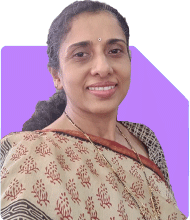Ramalingam Kalirajan |11047 Answers |Ask -Follow
Mutual Funds, Financial Planning Expert - Answered on May 23, 2024
He has an MBA in finance from the University of Madras and is a certified financial planner.
He is the director and chief financial planner at Holistic Investment, a Chennai-based firm that offers financial planning and wealth management advice.... more

Hello Dev, I require a financial planning guidance for next 20 years. At present - my age is 50 yrs & is unemployed.( Looking to start business but have doubt or opt for job ) Having term insurance of 1cr.health insurance of 10L. 50L in fd. Share market investment of 5l. Home Loan of 20l with emi 20k, for next 8 yrs. Wife ( 48age) is lecture earning 60k/month Daughter studing in 11 aspirant for engineering + PG at abroad. Having other asset of flat+ gold + plot will amount 50l. Thanking you- NN
Current Financial Situation and Goals
You are 50 years old, unemployed, and considering starting a business or opting for a job. Your wife is a lecturer earning Rs. 60,000 per month. You have a daughter aspiring for engineering and postgraduate studies abroad. You have Rs. 50 lakhs in fixed deposits, Rs. 5 lakhs in the share market, and a home loan of Rs. 20 lakhs with an EMI of Rs. 20,000 for the next eight years. You also have assets in the form of a flat, gold, and plot worth Rs. 50 lakhs.
Your detailed understanding of your current financial situation is commendable. You have taken significant steps by securing term and health insurance and investing in diverse assets.
Assessing Employment vs. Business
Job Stability
Opting for a job can provide a stable income stream, essential for meeting ongoing expenses, especially with a home loan EMI and your daughter's education.
Starting a Business
Starting a business involves risk but can offer higher returns. Evaluate your risk tolerance, potential business opportunities, and market conditions before deciding.
Insurance Coverage
Term Insurance
You have a term insurance of Rs. 1 crore, which is adequate. Ensure that the coverage remains sufficient as your financial situation changes.
Health Insurance
A health insurance cover of Rs. 10 lakhs is good. Consider increasing this coverage, given rising healthcare costs and your age.
Managing Existing Investments
Fixed Deposits
Fixed deposits provide safety but offer lower returns. Consider diversifying some of your FD investments into higher-yielding options.
Share Market Investments
With Rs. 5 lakhs in the share market, review the performance of these investments. Regular monitoring and rebalancing can enhance returns.
Home Loan Management
Reducing EMI Burden
Your home loan EMI is Rs. 20,000 for the next eight years. Consider making lump-sum payments towards the principal to reduce the EMI burden and interest outgo.
Balance Transfer
Explore the option of a home loan balance transfer to a lender offering a lower interest rate. This can reduce your EMI and overall interest burden.
Daughter’s Education Planning
Engineering and PG Abroad
Education costs, especially abroad, can be substantial. Start a dedicated education fund for your daughter, investing in diversified mutual funds to accumulate the required corpus.
Asset Management
Flat, Gold, and Plot
Your assets amount to Rs. 50 lakhs. Ensure they are effectively utilized or can be liquidated when needed for significant expenses like education or emergencies.
Investment Strategy
Diversification
Diversify your investments across asset classes to manage risk and optimize returns. Consider a mix of equity, debt, and hybrid funds.
Regular Investments
Continue regular investments through SIPs. This will help in rupee cost averaging and building a substantial corpus over time.
Evaluating Direct vs. Regular Funds
Disadvantages of Direct Funds
Direct funds save on commissions but lack personalized guidance. Professional advice from a Certified Financial Planner (CFP) can provide strategic insights and help in making informed decisions.
Benefits of Regular Funds
Investing through regular funds ensures you receive expert advice, optimizing your portfolio for better returns and risk management.
Retirement Planning
Building a Retirement Corpus
Plan to build a substantial retirement corpus. Regularly invest in a mix of equity and debt funds, considering your risk tolerance and time horizon.
Systematic Withdrawal Plan
Consider a Systematic Withdrawal Plan (SWP) post-retirement. This will provide a steady income stream while keeping your investments growing.
Emergency Fund
Importance of Liquidity
Maintain an emergency fund equivalent to 6-12 months of expenses. This provides liquidity and financial stability during unforeseen events.
Professional Guidance
Certified Financial Planner (CFP)
Engage a Certified Financial Planner for personalized financial advice. They can help you navigate complex financial decisions and achieve your long-term goals.
Conclusion
Balancing immediate financial needs with long-term goals is crucial. Diversify investments, reduce debt, and plan for significant expenses like education. Regularly review and adjust your financial plan to stay on track.
Best Regards,
K. Ramalingam, MBA, CFP,
Chief Financial Planner,
www.holisticinvestment.in
You may like to see similar questions and answers below
Ramalingam Kalirajan |11047 Answers |Ask -Follow
Mutual Funds, Financial Planning Expert - Answered on Jul 27, 2024
Ramalingam Kalirajan |11047 Answers |Ask -Follow
Mutual Funds, Financial Planning Expert - Answered on Jun 21, 2025
Ramalingam Kalirajan |11047 Answers |Ask -Follow
Mutual Funds, Financial Planning Expert - Answered on Aug 25, 2025
Radheshyam Zanwar |6825 Answers |Ask -Follow
MHT-CET, IIT-JEE, NEET-UG Expert - Answered on Mar 02, 2026
Ravi Mittal |706 Answers |Ask -Follow
Dating, Relationships Expert - Answered on Mar 02, 2026
Ravi Mittal |706 Answers |Ask -Follow
Dating, Relationships Expert - Answered on Mar 02, 2026
Patrick Dsouza |1453 Answers |Ask -Follow
CAT, XAT, CMAT, CET Expert - Answered on Mar 02, 2026
Nayagam P P |10928 Answers |Ask -Follow
Career Counsellor - Answered on Mar 02, 2026
Nayagam P P |10928 Answers |Ask -Follow
Career Counsellor - Answered on Mar 02, 2026
Dr Deepa Suvarna |177 Answers |Ask -Follow
Paediatrician - Answered on Mar 02, 2026
Ramalingam Kalirajan |11047 Answers |Ask -Follow
Mutual Funds, Financial Planning Expert - Answered on Mar 02, 2026
Ramalingam Kalirajan |11047 Answers |Ask -Follow
Mutual Funds, Financial Planning Expert - Answered on Mar 02, 2026
T S Khurana |558 Answers |Ask -Follow
Tax Expert - Answered on Feb 28, 2026

























